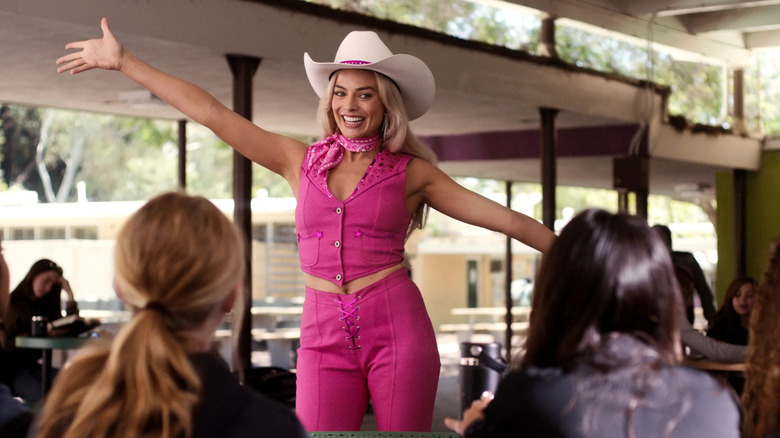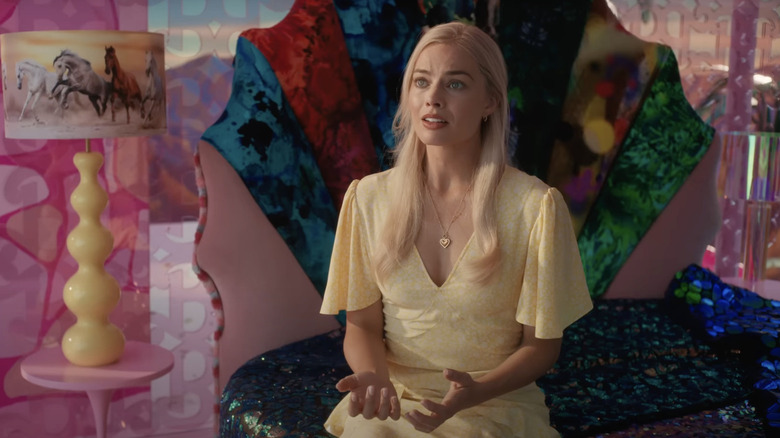Why Making Barbie 'Stereotypical' In The Movie Was Controversial But Necessary
Despite what that ol' "sticks and stones" idiom has to say, words have power, and words can absolutely hurt. In an interview with the New York Times, Margot Robbie explained that one little adjective to describe her character in "Barbie" became a bit of a sticking point with the Mattel Corporation, the folks who make the real-life Barbie dolls and served as producers on the film.
Director Greta Gerwig was required to attend Barbie Boot Camp before making the movie, and Robbie explained that she and Gerwig would have six-hour-long conversations with Mattel about what they were afraid would be depicted on screen. "We spent time at Mattel headquarters, we went into their factories, we watched them make a doll and we talked to people who make them," said Robbie. "They knew we were coming from a place of respecting the brand." She noted that Mattel had "a long laundry list of concerns," but ultimately gave the team total freedom. "They weren't allowed to dictate the movie, but we didn't want to make a movie that they weren't going to be supportive of as well," she said.
This is a company that once tried to sue the Europop band Aqua over their song "Barbie Girl," with particular anger about the line, "I'm a blonde bimbo." Lest we forget, in the 1990s, the word "bimbo" had yet to be reclaimed the way it has been in recent years. At one point in Gerwig's movie, the brash and angsty Sasha (Ariana Greenblatt) hurls a series of insults at Robbie's Barbie, calling her everything from a bimbo to a fascist. It's a shocking rant to hear knowing Mattel helped produce the film because all of the cruel things she says echo real-life complaints against the doll.
Mattel is hyper-aware of its brand and legacy, which is why they were worried about Robbie's character being named "Stereotypical Barbie."
'That's important for her journey'
There are a lot of words that exist as neutral descriptors in the English language that have socially been used as insults. For example, describing oneself as "fat" (like I do for myself) is a neutral term like "tall" or "brunette," but for many people, it's the source of ire as others have weaponized it as a term meant to cause harm. The word "stereotypical" falls under the same umbrella, where on its own it's a neutral term, but has since become an insult depending on who is saying it and what the intentions are behind the word.
"The word 'stereotypical' has negative connotations attached to it," explained Robbie. "[Mattel] asked if we would consider a different word." Robbie agreed that they could always call her "Generic Barbie," "Original Barbie," or "Blonde Barbie," but wanted Mattel to understand that using other words would miss the point the film is trying to make. "The word 'stereotypical' is important because she is already putting parameters around herself that she is, later in the movie, going to step out of and break free," Robbie said. "So that's important for her journey. She needs to start there, referring to herself as Stereotypical Barbie, because she's already putting herself down without realizing it."
When Stereotypical Barbie describes herself and her name, she does so in a neutral way, explaining that when someone is asked to "think of a Barbie," the visual of someone who looks like her is what they imagine. That's not inherently a bad thing, but as America Ferrera's Gloria later explains in her big monologue about womanhood, "Not only are you doing everything wrong, but also everything is your fault." She had to be Stereotypical Barbie because she had to be described with a neutral term that could also be used to discredit.
Welcome to womanhood, babe.

